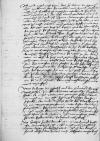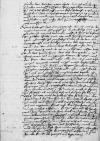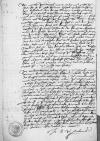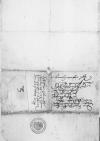Mir ist gestern(n) E(wer) Ir(barkei)t ⌊⌋ eigener hant / mit dem andren(n) ⌊⌋, die drey pauren betreffend und an den a(m)ptman zu der Eyle, / geworden(n), / dar innen sich E(wer) Ir(barkei)t (das nicht von nöten(n) gewest) entschuldigt, worum(m)b uff meyn(n) ⌊⌋, negst eigenerhant, / E(wer) Ir(barkei)t bisher nicht heth geantwurt, / ouch worum(m)b so lange vorczogen(n). / Was aber das ist, / das E(wer) Ir(barkei)t vortrauter weis, / mich belangend, / geschriben(n) / und das E(wer) Ir(barkei)t h(e)rn ⌊Czemen(n)⌋ mitgeteilt, / so er mir do von noch mit schrifften(n) oder muntlicher botschafft nichts hot lossen wissen(n), / kan ich nicht gruntlich wissen, / was das sein mues. Allein das ich mich losse beduncken, / das es dovon(n) sey, / wie ich bey ⌊ko(nigliche)r m(aieste)t⌋, u(nserm) al(er)g(enedigsten) h(e)rn und meyner g(enedigs)t(en) frawen der ⌊konigin⌋ vormacht bin / und so mit grosser unworheit / durch gifftigen(n) neit / angetragen(n), / do gegen ich mit Gote und der warheit ein bulwerk gebawet, / das, / wie ich hoff, / meine feinde wirt abhalten(n) / und die selbtige an tag geb(e)n. / Ists aber was anders, / bitt ich mit hohem fleis, E(wer) Ir(barkei)t wolt michs ouch vortrauter weis lossen(n) wissen. / Es sol / uff guttn glouben(n) / nicht von(n) mir komen(n). /
Der her ⌊Zceme⌋ ist negst(en) von der ⌊Wilden⌋ heim geczogen(n). / Ist bey mir nicht gewest, / idoch mir ⌊⌋ un(n)d alle abfertigung / mit andren(n) briven(n) von hove mir zugeschickt. / Das er aber noch im ausczoge oder widerkomen(n) bey E(wer) Ir(barkei)t nicht gewest, / wil ich in hiemit entschuldigt haben(n), / das er von ⌊Kostken⌋ wegen(n), / der im fast gedreut, / sein rese hot must heimlich halten(n), / ouch do mit gedocht(er) Kostke mit seinem(m) bosen anhange nicht ursach nemen(n), / so er villicht bey E(wer) Ir(barkei)t gewest, / ⌊land und stet⌋, / und nemlich in selbst, / hefftiger anzugeben(n) / und mit gruntloser ertichtung, / wie sie mir gethan, / zuvormachen(n).
 GStA, PK, HBA, C 2, No 64, f. 1v
GStA, PK, HBA, C 2, No 64, f. 1v
Ich wil E(wer) Ir(barkei)t nicht bergen(n), / das h(e)r ⌊Czeme⌋ in seynem(m) erstn(n) ankomen(n) gen der ⌊Wilden(n)⌋ / mit seinem(m) collega nicht fast lieblich ist angesehen worden(n), / so heslich und sverlich sein die ⌊h(e)rn land und stet⌋ / unnd nemlich ich und h(e)r Czeme / durch unsere feinde mit aller unworheit angetragen(n). / Ins endt aber, / so wir uns zu recht erbotten(n), / ouch gebeten(n) ⌊Kostken(n)⌋ mit uns vor ⌊ko(nigliche)r m(aieste)t⌋ ein tag zu legen(n), / ist aller handel linder geword(en). / Es ist ouch nyma(n)t gewest, / uff h(e)rn ⌊Czeme⌋ beger, / der vor ⌊ko(nigliche)r m(aieste)t⌋ het dorfft vortreten(n) und sein felslich angeben(n), bekennen(n), / oder uffentlich uns der gleichen was schuld geben(n). / Derhalb(e)n / ist al disse sache ins ⌊land⌋ uff die negste ⌊tagfart⌋ s(ancti) Stanislai[4] gen ⌊Graudencz⌋ verschoben(n), / do sol ⌊Kostke⌋ betlicher weis uns versunen(n). / So wir aber daran keinen(n) benugen(n) hetten(n), / wil uns ⌊ko(niglich)e m(aieste)t⌋ in der ⌊Kron(n)⌋, / wan ir m(aieste)t do hin(n) mit gesuntheit, / das Got gebe, / gelanget, / einen rechts tag mit ⌊Kostk(en)⌋ secz(e)n. / Sunst sein des meisten teils sachen(n) durch hern(n) ⌊Czemen(n)⌋ / noch unserm(m) willen ausgericht. / Vorstehe nichts von der botschafft, die an E(wer) Ir(barkei)t solde komen(n). / Es ist zu der ⌊Wilden paper damaged⌈[en]en paper damaged⌉⌋ das wort gangen(n), / das die ⌊Lifflender⌋ mit hundert pferd(en) etliche botschaffter solt(e)n an ⌊ko(niglich)e m(aieste)t⌋ schick(en). / Kan ouch nicht wissen aus was ursachen(n).
Was belangt die ⌊Pfalcz⌋ und den frumen(n) etc., hot E(wer) Ir(barkei)t wol gethon zuerkunden(n), wie es um(m)b in ein gestalt habe. / So E(wer) Ir(barkei)t wirt was gewisses haben(n), / wil ich mich an ⌊ro(mische) m(aieste)t⌋ hoff wol wissen dar in zu schick(en). / Der ander vorslag aus der Mark(en), mocht er ein vorgang gewynnen(n). / Wer ⌊dissen landenn(n)⌋ fueglicher. / Es wirt ouch, / wie ich mich vorsehe, E(wer) Ir(barkei)t / nicht kleinen(n) wolgefallen(n) hirinnen ⌊ko(nigliche)r m(aieste)t⌋ thun, / so der sachen(n) E(wer) Ir(barkei)t ein anfang gebe. / Es wer beyden teilen(n) erlich und wol geleg(en).
Des holczes halbn(n) danck ich E(wer) Ir(barkei)t und werd hochlicher dancken(n), / so sich E(wer) Ir(barkei)t amptman(n) / guttlich wirt lossen finden(n). / Ich weis, E(wer) Ir(barkei)t ist den kirchn so feind nicht, / dar innen(n) nicht abgötter angebeth,  GStA, PK, HBA, C 2, No 64, f. 2r sunder das lauter wort Gots, / das ich elender in sunden mensch ouch gern hore, / gepredigt wirt, / dar z written over i⌈izz written over i⌉u ich solch holcz uff meine kost(en) bedarff. / E(wer) Ir(barkei)t wirt befhelen, / das mugliche vorgenugung, / so es anders nicht sein wil, / von mir genomen(n) werde, / wo mit mich aber E(wer) Ir(barkei)t mher dan zuvor verphllicht written over ...⌈... illegible⌈...... illegible⌉phllicht(?)phllicht written over ...⌉ wirt sich machen. etc.
GStA, PK, HBA, C 2, No 64, f. 2r sunder das lauter wort Gots, / das ich elender in sunden mensch ouch gern hore, / gepredigt wirt, / dar z written over i⌈izz written over i⌉u ich solch holcz uff meine kost(en) bedarff. / E(wer) Ir(barkei)t wirt befhelen, / das mugliche vorgenugung, / so es anders nicht sein wil, / von mir genomen(n) werde, / wo mit mich aber E(wer) Ir(barkei)t mher dan zuvor verphllicht written over ...⌈... illegible⌈...... illegible⌉phllicht(?)phllicht written over ...⌉ wirt sich machen. etc.
Was belangt das ⌊camergericht⌋, / bin ich noch in der meynung, wie ich negst zu ⌊Resenburg⌋ mit E(wer) Ir(barkei)t geredt, / ist meins bedunks nicht so hart zu befaren(n). In gutter hutte mit vor rodt zu siczen(n), / wie E(wer) Ir(barkei)t thut, / ist nicht zu misloben(n). / Wer ist, der dem ⌊camergericht⌋ aus ⌊deucz(e)n landen⌋ die execucion thun wil? / Der von ⌊Cronenberg⌋ bedorfft mher darzu. / E(wer) Ir(barkei)t weis wol, / do es ir selbst von(n) nöthen tath / und das zuvor heth, / das iczt darwider E(wer) Ir(barkei)t hoth, / wie vil ausgericht wart, / ⌊ko(niglich)e m(aieste)t⌋ / und die ⌊Kron⌋, / dar neb(e)n wir alle, / die es so wol alse E(wer) Ir(barkei)t an geth, / werd(en) E(wer) Ir(barkei)t nicht lossen(n). / Mein roth, den E(wer) Ir(barkei)t hirinnen(n) begert, / so weit mein slechter vorstand sich streckt, / ist, / E(wer) Ir(barkei)t halde ⌊ko(niglich)e m(aieste)t⌋ an, / so sich der mossen(n) was begebe, / oder dergleichen was erfaren wurd, / das aus ⌊deuczn landen⌋ was wurd vorgenomen(n), / das ir m(aieste)t bey czeiten darzuthet, / uns ouch ⌊hie im land⌋ befhele, / das wir in gereitschafft weren(n). / Es ist aus ⌊deuczen landen⌋, / wie E(wer) Ir(barkei)t weis, / nicht so herein zu fligen(n). / Es musten(n) erst vil fedren fallen etc. Was ich vor mich derhalben(n) / bey ⌊ko(nigliche)r m(aieste)t⌋, / in der ⌊Kron⌋ / und bey den ⌊h(e)rn hie land und steth⌋ E(wer) Ir(barkei)t zu nucz und ehren(n) werd wissen(n) vorzuwenden(n), sol an meynem(m) fleis und treuhercziger furderung nichts abghen(n). / E(wer) Ir(barkei)t sey wol beherczt und habe irer ⌊underthan(n)⌋ lieb / und forchte sich der wandelbaren(n) und uneynigen(n) anslegen(n) aus ⌊deuczen(n) landen(n)⌋ gancz wenig. / Der in Got vortraut, wirt num(m)er verlossen(n). / Dem hab ich ouch al mein anligen(n) befholen(n), / do von vil zu schreib(e)n, / wil aber aus der feder nicht superinscribed⌈nichtnicht superinscribed⌉. Disse czeit mues ich lossen uber ghen(n). / Ich hoffe dennoch, / so die worheit under dem(m) sne her vor komet, / die zceit sol ouch besser werd(en).
 GStA, PK, HBA, C 2, No 64, f. 2v
GStA, PK, HBA, C 2, No 64, f. 2v
Von newen(n) zceitung(en) / weis ich dis mol nichts besunders. / Es ist ⌊ko(nigliche)r m(aieste)t⌋ kamerer spigel widerkomen(n) aus dem ⌊Niderland⌋ von(n) ⌊konige Marien(n)⌋, / welche sverlich krank ist gewest etlich monat lang, / ouch das nicht ein mol am leb(e)n geczweifelt ist word(en) / und hot mir etliche brive vom botschafft(er) des ⌊herczogen(n) von(n) Meylant⌋ brocht, / welcher seynem(m) hern(n), dem herczogen(n), / mit dem h(e)rn ⌊Luduigen von Prat⌋ sol ⌊konig Cristierns⌋ eldeste ⌊tochter⌋ zu bringen(n). / Schreibt, der ⌊konig von Engellandt⌋ mit dem ⌊babst⌋ uneinst sey / und vorharre in seiner unczimlichen heirat, / ⌊kay(serlich)e m(aieste)t⌋ habe aber newe lande und insuln gefund(en) mit vil geldes / unnd das die aus ⌊Arragon⌋ kay(serlich)r m(aieste)t haben(n) negst geb(e)n uber sechs mol hundert tausent duc(aten), / das es in ⌊Italien⌋ stil sey. / Die ⌊konigin Maria⌋ habe ire botschaffter geschickt an die hense stet. / ⌊Herczog Cristoff von Wirtenberg⌋ hab wenig zu ⌊Aug written over Nur(?)⌈Nur(?)AugAug written over Nur(?)⌉sburg⌋ aus gericht / und der ⌊adel im wirtenbergsch(e)n⌋ werd im fast abzogen un(n)d abgekofft etc. Von ⌊Hamburg⌋ hore ich nichts. / Was mir sunst wirt zukomen(n), wil ich E(wer) Ir(barkei)t nicht vorhalt(e)n. /
Im andren ⌊⌋ hab ich lossen E(wer) Ir(barkei)t schreib(e)n meiner armen leut gebrechen(n), / bittend, / wolde lossenn(n) die supplicacion ubersehen(n), / die E(wer) Ir(barkei)t camermeist(er) mit sich von mir nham(m), / allein zu wissen(n), wie solche klegliche sach(e)n ein gestalt haben(n). / Ich wil mich gern(n) in allem nach ms. moch(!)
⌈nachnach ms. moch(!)
⌉ meynem(m) hochst(e)n vormugen(n) E(wer) Ir(barkei)t vorhalten(n), / der gleich(e)n ich meynen(n) amptleut(e)n auch befhol(e)n. / Wor inne ich derselbig(en) um(m)er werd wissen fruntlich zu dinen(n), / wil ich unvordrossen(n) und fleissig gefund(en) werden(n), bittend E(wer) Ir(barkei)t wolt mein freuntlich(e)r liber h(e)r und hochgunstiger freundt sein und bleiben(n). ⌊Ihesus Chr written over ...⌈... illegible⌈...... illegible⌉ChrChr written over ...⌉(istu)s⌋, der were seligmecher, mach uns alle selig / und gebe E(wer) Ir(barkei)t in glukselig(e)r regirung und langweriger gesuntheit / seine göttliche ewige gnad / und thu mich mit disser eylenden beser schrifft E(wer) I written over G⌈GII written over G⌉r(barkei)t befhel(e)n, / der schrifft ich bas dan die meyne lesen(n) kan. /
 GStA, PK, HBA, C 2, No 64, f. 3v
GStA, PK, HBA, C 2, No 64, f. 3v
 GStA, PK, HBA, C 2, No 64, f. 1r
GStA, PK, HBA, C 2, No 64, f. 1r  GStA, PK, HBA, C 2, No 64, f. 1v
GStA, PK, HBA, C 2, No 64, f. 1v  GStA, PK, HBA, C 2, No 64, f. 2r sunder das lauter wort Gots, / das ich elender in sunden mensch ouch gern hore, / gepredigt wirt, / dar z written over i⌈izz written over i⌉u ich solch holcz uff meine kost(en) bedarff. / E(wer) Ir(barkei)t wirt befhelen, / das mugliche vorgenugung, / so es anders nicht sein wil, / von mir genomen(n) werde, / wo mit mich aber E(wer) Ir(barkei)t mher dan zuvor verphllicht written over ...⌈... illegible⌈...... illegible⌉phllicht(?)phllicht written over ...⌉ wirt sich machen. etc.
GStA, PK, HBA, C 2, No 64, f. 2r sunder das lauter wort Gots, / das ich elender in sunden mensch ouch gern hore, / gepredigt wirt, / dar z written over i⌈izz written over i⌉u ich solch holcz uff meine kost(en) bedarff. / E(wer) Ir(barkei)t wirt befhelen, / das mugliche vorgenugung, / so es anders nicht sein wil, / von mir genomen(n) werde, / wo mit mich aber E(wer) Ir(barkei)t mher dan zuvor verphllicht written over ...⌈... illegible⌈...... illegible⌉phllicht(?)phllicht written over ...⌉ wirt sich machen. etc.
 GStA, PK, HBA, C 2, No 64, f. 2v
GStA, PK, HBA, C 2, No 64, f. 2v 



